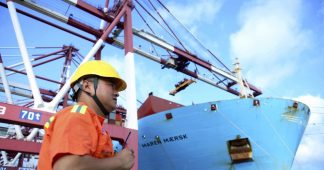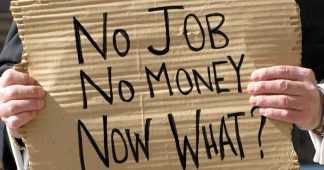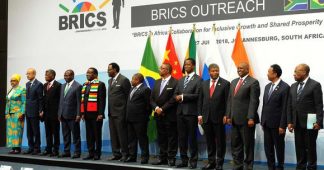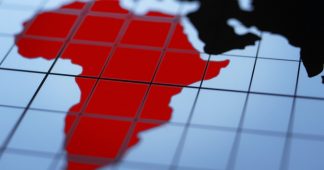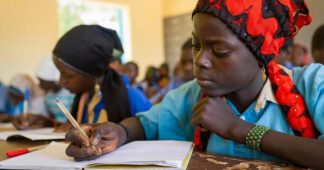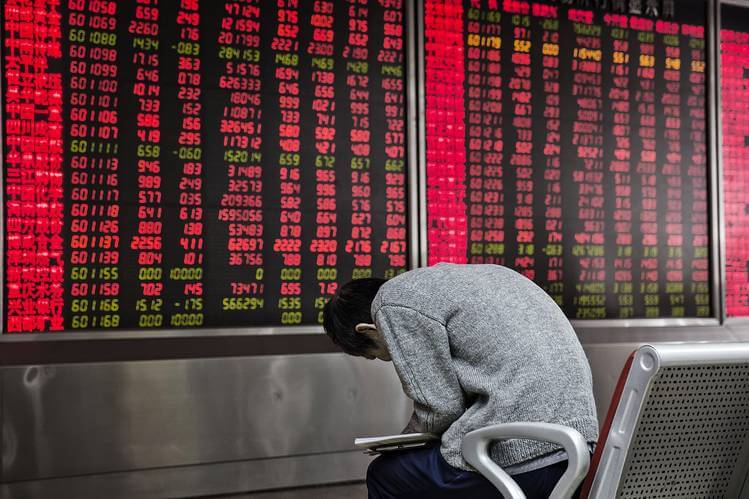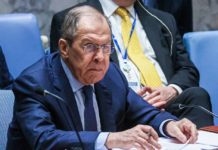By Glen Ford
20 Dec 2018
The Americans wager that they can exercise veto power over African political alignments by force of arms, through AFRICOM’s massive military infiltration of the region.
“The ‘West’s’ political economies are spent forces, incapable of either keeping up with China’s phenomenal domestic growth or of competing with China in what used to be called the Third World.”
Donald Trump last week trotted out his war dog, National Security Advisor John Bolton, to growl and snarl over China’s attempts to “gain a competitive advantage” in Africa through “predatory” practices that supposed include “bribes, opaque agreements, and the strategic use of debt to hold states in Africa captive” to Beijing’s global schemes.
Bolton gave his speech at the right-wing Heritage Foundation, a place that specializes in crafting social policies that appeal to white supremacist majorities within the U.S. domestic order. He could be confident that the Heritage audience knows little about the actual state of the world, holds facts in low regard, and gives less than a damn about Africa. There was no need for Bolton, the man with the comic mustache, to make sense with this crowd, so he didn’t even try.
The net effect of China’s investments in Africa, said the nonsensical Bolton, has been to “stunt” Africa’s economic growth. Only blocks away from the Heritage Foundation, in Washington, the staff and officers of the International Monetary Fund — the guys that actually do hold much of Africa and the developing world “captive” with loan structures and political conditions that stunt the ability of governments to serve their people — had quite a different assessment of China’s impact on the African continent, whose dramatic growth coincides with Beijing’s rise to number one investor.
“China actually increased its contribution to the growth of sub-Saharan African exports, which helped cushion the impact on sub-Saharan Africa growth during the Great Recession.”
“Access to new markets for its raw materials has spurred Africa’s exports, which quintupled in real value over the past twenty years ,” the staffers wrote in their inhouse IMFBlog . “But maybe even more importantly, sub-Saharan Africa’s trade engagement with China and other new trading partners has reduced the volatility in its exports. This helped cushion the impact of the global economic crisis in 2008 and 2009, when advanced economies experienced a deep economic deceleration, and thus curbed their demand for imports. At the same time, China actually increased its contribution to the growth of sub-Saharan African exports, which helped cushion the impact on sub-Saharan Africa growth during the Great Recession. On the import side, access to cheap Chinese consumer goods, from clothing to mopeds, has boosted African living standards and contributed to low and stable inflation.”
China and its “command economy” fared far better than the rest of the world in coping with the “American disease” – the near melt-down of capitalist financial markets in 2008-09 – and thus was able to provide Africa and its other trading partners some respite from the chaos and near collapse that enveloped the West. Most importantly, the Chinese offered what even the Americans concede is a “no-strings” arrangement, attaching no political conditions to their loans and projects.
“China was able to provide Africa and its other trading partners some respite from the chaos and near collapse that enveloped the West.”
To be sure, China’s voracious appetite for raw materials to fuel its own miraculous growth is central to its global trade strategy. But the folks at Bloomberg, the American oligarch-owned financial network, testify to the broad and deep character of China’s African trade and investment policy. “Although securing access to natural resources is surely one of China’s goals, its investments in Africa go beyond extractive industries,” wrote Bloomberg opinion columnist Noah Smith , in September of this year. “The sectors receiving the most Chinese money have been business services, wholesale and retail, import and export, construction, transportation, storage and postal services, with mineral products coming in fifth. In Ethiopia, China is pouring money into garment manufacturing — the traditional first step on the road to industrialization.”
There is no question that China’s deep penetration of African markets has caused lots of dislocation of existing African enterprises, or that China’s policy of importing its own workforces to staff major projects is cause for resentment among Africans in need of work. It is also true that Chinese entrepreneurs have flooded the nooks and crannies of many African economies, sometimes crowding out real or potential local small businesspeople. But it is generally agreed that China’s trade policies in Africa are not coercive or marked by “bribes, opaque agreements, and the strategic use of debt to hold states in Africa captive,” as Bolton alleges. Rather, as Black Alliance for Peace (BAP) lead organizer Ajamu Baraka writes in this week’s issue of BAR, “China provides African states a modicum of space to exercise more effective national sovereignty than had ever been afforded them by the European colonial powers that carved up and unmercifully exploited African labor and land.”
“Although securing access to natural resources is surely one of China’s goals, its investments in Africa go beyond extractive industries.”
As if Africa and the world need to be reminded, it was European colonialism that robbed Africa of people and resources for hundreds of years. Colonial powers claim the right to exclusively exploit the material and human resources of colonized peoples, to treat whole regions of the world as national property. The U.S., as the world’s premier white settler state, assumed the mantle of protector of the international white supremacist order after World War Two, from which it emerged as the top industrial power. In the 21stcentury, however, the U.S. imperialist overlord has been crippled by the accumulated contradictions of late stage capitalism and its own hyper-corruption and racism-induced cognitive incapacities (of which Bolton and Trump are prime, almost farcical examples).
The simple, yet earth-shaking truth is: the United States and western Europe lack the capacity to mount investments in Africa that are conducive to the continent’s economic and social development. The same applies to Latin America, where China is the number one trade and investment partner. The “West’s” political economies are spent forces, incapable of either keeping up with China’s phenomenal domestic growth — which should be seen as Beijing’s re-assumption of its historical status as the center of the world economy — or of competing with China in what used to be called the Third World. The system is collapsing at its imperial center, the United States, which is incapable of investing in its own crumbling infrastructure.
“It is generally agreed that China’s trade policies in Africa are not coercive or marked by ‘bribes, opaque agreements, and the strategic use of debt to hold states in Africa captive.’”
The United States does not have an Africa problem, it has a capitalism problem that is made more acute — at home and abroad — by its deep history of white supremacism and insular ignorance. U.S. elites wish they could muster the “soft power” to effectively penetrate and dominate the economies of Africa, Latin America and central, south and southeast Asia, but U.S. power is instead diminishing, daily. Except for the dollar’s artificial status as world reserve currency, the U.S. is no longer an economic superpower; it can only intervene decisively in global affairs by force of arms and military intimidation. China is truly a global economic superpower, capable of credibly launching a multi-continental Belt and Road (and maritime) new order in industrial production and trade – not a socialist order, but one that is far more equitable and voluntary than the western, neocolonial model — which it is offering to Africa.
“The U.S. is no longer an economic superpower; it can only intervene decisively in global affairs by force of arms and military intimidation.”
The United States offers only “more guns, more bases and more subversion,” in Ajamu Baraka’s words. Since the inception of AFRICOM, the U.S. Military Command in Africa, in 2008, Washington has placed its strategic bets on dominating Africa by converting the continent’s military class into servants of U.S. empire. The Americans wager that they can exercise veto power over African political alignments by force of arms, through AFRICOM’s massive military infiltration of the region. U.S. strategic thinkers are wagering that, should African nations become too enamored of the Chinese economic model, Washington can call on its dependent African war dogs to create regime change, or to sow chaos and genocidal warfare, as Uganda and Rwanda have been doing in the Democratic Republic of Congo for a generation.
John Bolton, a truly freakish example of the American that is always eager to annihilate non-white people, is threatening to exercise that U.S. military veto in Africa, with his warning to the natives not to get too close to the Chinese (or Russians — he threw them in the pot for good measure). That’s the meaning of his warning that the U.S. will now choose its African partners more carefully; it implicitly threatens to put some regimes and social movements on an enemies list. Bolton’s threats to curtail U.S. “foreign aid” have far more military than economic weight, since most U.S. “aid” is military, or contingent on military cooperation with AFRICOM.
“China is truly a global economic superpower, capable of credibly launching a multi-continental Belt and Road (and maritime) new order in industrial production and trade.”
U.S. “economic” assistance is hopelessly entangled with mandates that Africans contract with American corporations whose services are so vastly overpriced as to be worse than useless for national development. But such is also the case on the American domestic scene, where late stage capitalism cannot build even one mile of high-speed rail, while China has constructed 15,500 miles of ultra-modern railway, and is extending these veins of trade and communication throughout Eurasia.
African civil society will have to choose between a U.S. alignment that over-arms the continent’s militaries for the benefit of Euro-American multinational corporations, or takes advantage of China’s offer of structural development with no strings attached and a multiplicity of markets and investors — the freedom to shop around for partners in progress. John Bolton and his boss, being professional racists, are boorishly forcing the issue on Africa, but the Democrats offer the same dead-end deal, only in more diplomatic language.
“Late stage [US] capitalism cannot build even one mile of high-speed rail, while China has constructed 15,500 miles of ultra-modern railway.”
This is not a peculiarly African dilemma, or even strictly a problem of developing nations. U.S. elites have no program for their own citizens other than endless austerity and war. The corporate oligarchy is incapable of remaking the U.S. national infrastructure, despite the fact that tools for national regeneration are available and have already been deployed, during the Great Depression. Their only vision is of capitalist “creative destruction” devoid of security for the masses of people, and to prevail against foreign threats to their global dominion by force of arms. They have now weaponized the dollar through sanctions against everyone that disobeys U.S. foreign policy dictates, including putative U.S. allies.
If, in the end, bullies and abusers have no friends, then we are close to the end of U.S. imperialism.
